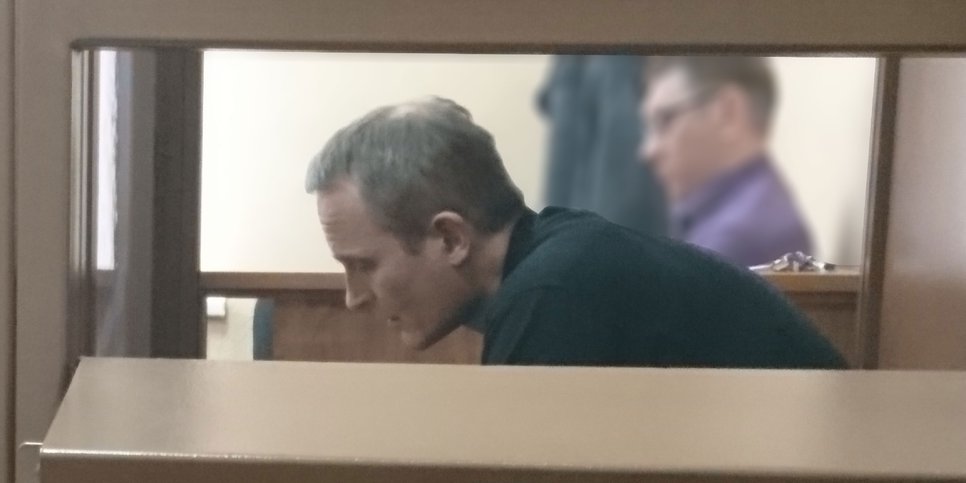Photo: Dennis Christensen during one of the court hearings
Photo: Dennis Christensen during one of the court hearings
What Did the Prison and Prosecutor's Office Do to Prevent the Danish Believer Dennis Christensen From Going Free?
Oryol Region, Kursk RegionOn June 26, 2020, the Lgov prison authorities illegally placed Dennis Christensen in a cell of a special punishment block (EPKT), typically used for malicious offenders. Given that his health has deteriorated, the move seems to be a calculated attempt to break him. At the same time, the prosecutor's office appealed the mitigation of his sentence, which they had originally supported in court. What happened?
What did the prosecutor's office do?
De jure, Dennis Christensen has already spent more than 4 out of 6 years in prison for his faith. Already one year ago, he was eligible for parole or another mitigation of his sentence. On the 4th attempt, his petition went to court, and on June 23, 2020, the Lgov District Court ordered the replacement of the remaining part of the sentence with a fine of 400,000 rubles. Artem Kofanov, Deputy Prosecutor of the Kursk Prosecutor's Office for the Supervision of Correctional Institutions, who took part in the trial, supported the mitigation of the punishment. But two days later, on June 25, Aleksey Shatunov, the prosecutor of the same prosecutor's office, stated that the court ruling was illegal and demanded to cancel it and sent the material for a new trial to the same court. What made the prosecutor's office change its position is unknown.
Why did Prosecutor Shatunov consider the decision to have been illegal? In his presentation, he referred to the administration of the Lgov prison, which, according to him, characterized the prisoner unsatisfactorily: "Due to the lack of positive activity in his work and public life of the correctional facility."
Shatunov's arguments were already considered invalid by the Lgov district court when they were voiced by the prison representatives during the trial on mitigation of the punishment. The defense submitted to the court expert reports confirming that Christensen has physical conditions that exclude him from physical labor: industrial work in the prison and participation in other types of labor. In turn, the representative of the penitentiary was forced to admit that the prison could not provide him with the type of work that would be in accord with his physical limitations. The court attached medical documents to the case and apparently relied on them in making its decision.
What did the prison do?
At the same time as the unexpected actions of the prosecutor's office, events were developing in the Lgov prison: on June 25, two reports against Christensen were made at the same time. The first one — for the fact that he was in the food room at a wrong time, and the second — for the fact that he was in the barracks in a T-shirt, without a jacket. This was enough to have him sent to the EPKT for 10 days. In penal colonies, this is the strictest of measures for particularly vicious violators of prison order.
According to the law, such measure is taken only in a case of repeated, serious violations by the prisoner and only after a medical examination for the absence of diseases that prevent the detention in the EPKT. Neither of these measures happened with Christensen.
"The colony administration chose a strange excuse to put Christensen in the EPKT as a particularly dangerous offender. The list of gross violations is given in Article 116 of the Penal Enforcement Code, and there is nothing in it that Christensen did. According to the administration of the colony, it turns out that being in a shirt in the barracks is the same as rioting or taking drugs," says Yaroslav Savulskiy, representative of the European Association of Jehovah's Witnesses.
The believer and another prisoner are in a cell measuring 3.3 meters by 2.3 meters. The room is poorly ventilated and there is mold, which threatens the health of Christensen, who suffered pneumonia a few months ago. "Dennis has been diagnosed with a serious spinal cord condition. The administration of the colony is aware of this, but placed him in conditions where he has to sleep on a hard bed, experiencing excruciating pain," said the lawyer of the believer.
Christensen himself told the lawyer that at the time of his alleged violations in similar circumstances, there were other prisoners with him, but he alone was sent to the EPKT. "This leads to the idea that there is a planned action, which is necessary to prevent Dennis from being released by court order," said the lawyer.

